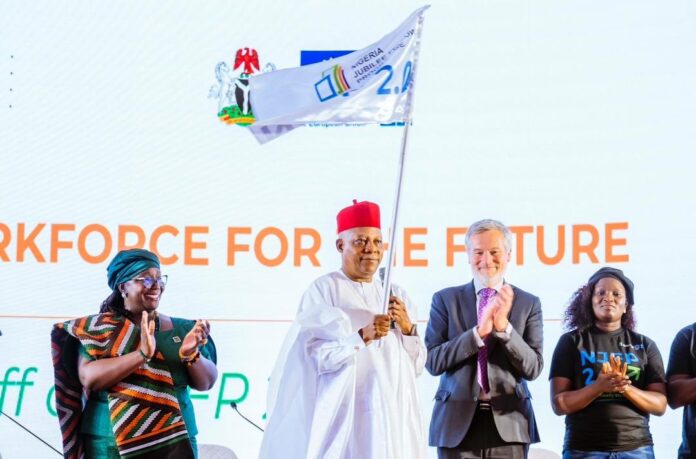The federal government has announced plans to invest $220 million to create more job opportunities for young Nigerians under the Nigeria Jubilee Fellows Programme (NJFP) 2.0.
Vice-President Kashim Shettima made the announcement on Wednesday in Abuja during the official launch of the second phase of the programme.
According to Shettima, the new phase of the initiative—developed in partnership with the European Union (EU) and the United Nations Development Programme (UNDP)—will focus on helping young graduates gain real work experience, professional training, and mentorship. The goal is to make them more employable and better prepared for the job market.
“Our goal is to bridge the transition gap between learning and earning for thousands of young Nigerian graduates who have the education but not always the opportunity,” Shettima said.
He explained that NJFP 2.0 aims to connect graduates’ skills with the needs of modern industries, especially in technology, energy, agriculture, and the creative sector.
The vice-president also emphasised that the programme is designed to turn Nigeria’s large youth population into a powerful economic force by linking talented young people to real career opportunities and encouraging private sector involvement.
“This programme proves that when the government provides structure, partnership, and purpose, young Nigerians rise to the occasion,” he added.
Shettima said President Bola Tinubu’s administration plans to make the programme a permanent part of Nigeria’s national development strategy by including it in government planning and budgeting systems. This will ensure it continues even after donor support ends.
The first edition of the Nigeria Jubilee Fellows Programme was launched in September 2021 to give young graduates a one-year paid internship in both private and public sector organisations. That phase targeted over 20,000 fellows across the country, helping them gain work experience, digital skills, and mentorship.
The new phase, NJFP 2.0, builds on that success, coming at a time when Nigeria’s unemployment rate has seen slight changes — rising to 5.3% in the first quarter of 2024 before dropping to 4.3% in the second quarter, according to the National Bureau of Statistics (NBS).
The government hopes that this renewed effort will further reduce unemployment and give more young Nigerians the tools they need to build meaningful careers.



